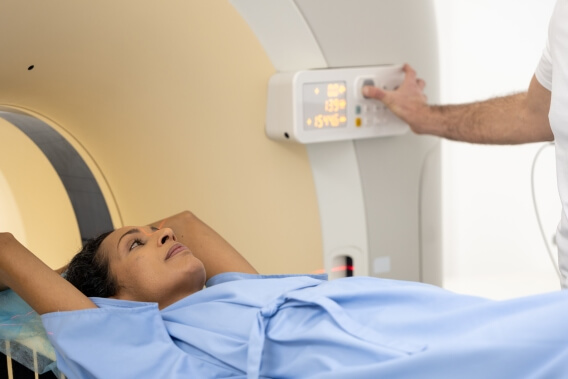Advice for Mesothelioma Patients: How to Handle ‘Scanxiety’
Cancer & CaregivingWritten by Tamron Little | Edited By Walter Pacheco

One thing is for sure, when you’re diagnosed with mesothelioma, getting different types of imaging scans becomes the new normal.
Whether it’s CT scans, PET scans, bone scans, etc., some patients pretty much get used to it. As for me, I did get used to the routine of going in for scans, but I still experienced “scanxiety.”
So, what is scanxiety? Just what it sounds like, a combination of scan and anxiety.
Here’s how I break it down:
Scan: A type of medical technology physicians use to get detailed images of specific organs and body parts.
Anxiety: An intense feeling of worry or fear that can bring about a fast heart rate, sweating and even rapid breathing.
Early Scans May Cause Anxiety
When I was first diagnosed with peritoneal mesothelioma, I had so many types of scans – too many to count, literally! I remember every time I went to have a scan I would feel nauseous, get sweaty palms and just have an overwhelming feeling of fear. Especially when I had to drink the contrast dye. We later found out I was somewhat sensitive to it.
My first scan was a horrible experience. It took me so long to drink the contrast, and when I did I vomited. Then we went for the scan and they started running the dye in. It burned, my entire body was hot and I vomited again!
They couldn’t get the images that initial time so they tried a second attempt. Eventually when I went in for the CT scan they had to run the dye in slowly and were prepared in case I vomited.
In my case I do believe the scanxiety started because of the horrific experience I had and then me being fearful of what the scan would show.
This usually is a fear for most cancer patients because a scan will show if something’s in your body that shouldn’t be there, such as a tumor. My husband experienced this when he was diagnosed with cancer. I wasn’t able to be there, which I will always regret. Even with his scans I get fearful and tense until we get the results.
Scan day became an entire theatrical production with me. Well, I may be exaggerating just a tad, but it felt like a huge ordeal. From my grandma asking me if I was OK every other second, to my mother not taking her eyes off me, to my sister secretly sobbing, it definitely caused some anxious moments.
I believe we all have scanxiety in the beginning. One thing I came to realize was that it was to be expected. We had never been in that type of situation before and we didn’t know what to think.
Scan Frequency Differs by Patient
The frequency of scans can depend on the patient and their progression. Before I had the HIPEC surgery I had a lot of preliminary scans. After my surgery I had a follow-up CT scan a couple of weeks later. Then, after my doctor saw I was doing well with no cancer being found, it was one every six months. Then it was every 18 months up until the five-year mark.
With peritoneal mesothelioma, the prognosis is not so good, therefore five years cancer-free is a miracle. After being five years cancer-free my doctor still wanted to follow my journey, so we kept the scans as needed or every two years.
Fourteen years later, due to some other health issues I’ve had, I still keep the same schedule of one year to 18 months for my scans. I do see a hematologist/oncologist often to keep track of my platelet count and blood levels.
I posed a question to The Mesothelioma Center’s Facebook support group and asked if anyone still gets scanxiety. To my surprise, most said they have had so many scans that it’s just lodged into their routines. I can totally relate, but I’m sure deep down inside they are still a little anxious.
We’re all human, right?
Tips & Tricks to Help Cope with Scanxiety
Patients and family members can all experience scanxiety. Remember that it may be more severe for some. I’m sure when people think of anxiety they think of hyperventilating and passing out, but that’s not always the case. Even if you just feel nervous, that’s part of the anxiety.
Here are some things that have helped me cope with scanxiety:
- Think positive thoughts. I know this may seem clichéd, but it works. Thinking positively will take your mind off the scan. And when you think positively you will say to yourself, I am going to be OK!
- Practice breathing exercises. Studies have proven that being able to control your breathing helps with calming your mind and body.
- Stay off Google. I’m sure I’m not the only one who uses Google for just about everything, even diagnosis and symptoms. But this can cause high anxiety.
- Be honest. Be honest with yourself and your family that you are nervous, and talk through it with them.
Having scanxiety is perfectly normal in my book, but it doesn’t have to get to the point where the fear is crippling you. It’s OK to have butterflies in your stomach or a lump in your throat.
Allow yourself to feel the feel, as they say. Allow yourself to be in the moment and look for the hope within your situation.




